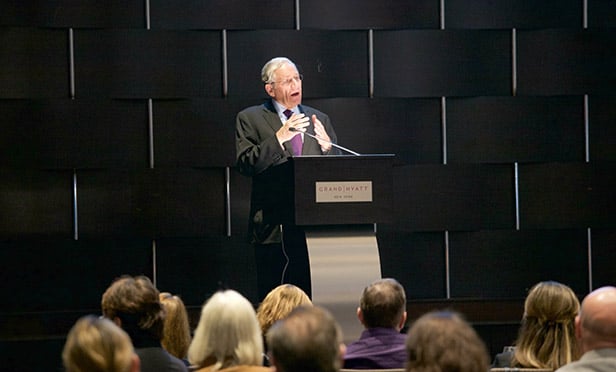
NEW YORK CITY—As someone who's “tried to write about and understand eight presidents, from Richard Nixon to Barack Obama,” iconic journalist Bob Woodward knows a great deal about the importance of the Presidential election and the influence that has been exerted by the men who've held the position.
He broke down what it means—and provided reasons to be concerned as well as hopeful—in a talk Tuesday night in Midtown to CoreNet Global NYC.
“It's the age of the American presidency, and more power accrues each time,” said Woodward, the associate editor of the Washington Post who rose to fame as one half of the journalistic duo that broke the story of the Watergate scandal. “Executive power resides with one person, not the Cabinet or any government official.”
During George W. Bush's presidency, Woodward was meeting with academics and the two-time Pulitzer Prize-winning journalist spoke of the President's ability as Commander-in-Chief to declare war. They corrected him, noting that the Constitution stipulates the role Congress must make in such a decision.
However, Woodward said, “That's not how it's worked practically. The Commander-in-Chief can deploy force as he sees fit. As we go into the Trump era, we have to understand the centrally of the Commander-in-Chief's authority and leadership.
“Whether for good, bad or in between,” he continued, “Trump is going to determine so much.”
For many—including Woodward—that raised concerns during the election campaign, and continues to do so.
“In March, I and a young reporter interviewed Trump. Afterward, we ran a long story and led with [Trump's] view that the economy was in such bad shape and was headed for a major recession. He said so much that I thought disqualified him. Trump said he brings out rage in people; it's a president's job to do the opposite.”
However, he noted, “We're in such a new world with this president. In the movie Dead Poet's Society, there's a scene where Robin Williams' character, a teacher, is in class and the students aren't understanding the lecture. He stands on the desk and says 'I stand on this desk to remind myself we need new ways to think about things.' That's where we are now in the world of politics.”
And in that spirit, Woodward contended, the nation needs to move forward. “The President needs to locate the next stage of good for a majority of the country, state what that is and strategically come up with a plan to get there. It could be war, healthcare, whatever, but it has to be something for the majority, not just for one party or interest groups.”
Woodward expressed both fear and optimism about the future. “My chief worry is a secret government. The people in government have increasing levels of power, the messengers have more power to manipulate and people have the power to wall themselves off. A judge said, 'Democracies die in darkness.' If we don't know what's going on and secret government prevails, we could partake in that darkness.”
However, the storied journalist noted, “An act can't be fully understood if the intentions aren't taken into account and I don't think Donald Trump's intentions are to screw up the country—they're 'I want to fix things.' He contradicts himself on that, for sure, but you have to give him the benefit of the doubt because he has stunning levels of power.”

He broke down what it means—and provided reasons to be concerned as well as hopeful—in a talk Tuesday night in Midtown to CoreNet Global NYC.
“It's the age of the American presidency, and more power accrues each time,” said Woodward, the associate editor of the
During George W. Bush's presidency, Woodward was meeting with academics and the two-time Pulitzer Prize-winning journalist spoke of the President's ability as Commander-in-Chief to declare war. They corrected him, noting that the Constitution stipulates the role Congress must make in such a decision.
However, Woodward said, “That's not how it's worked practically. The Commander-in-Chief can deploy force as he sees fit. As we go into the Trump era, we have to understand the centrally of the Commander-in-Chief's authority and leadership.
“Whether for good, bad or in between,” he continued, “Trump is going to determine so much.”
For many—including Woodward—that raised concerns during the election campaign, and continues to do so.
“In March, I and a young reporter interviewed Trump. Afterward, we ran a long story and led with [Trump's] view that the economy was in such bad shape and was headed for a major recession. He said so much that I thought disqualified him. Trump said he brings out rage in people; it's a president's job to do the opposite.”
However, he noted, “We're in such a new world with this president. In the movie Dead Poet's Society, there's a scene where Robin Williams' character, a teacher, is in class and the students aren't understanding the lecture. He stands on the desk and says 'I stand on this desk to remind myself we need new ways to think about things.' That's where we are now in the world of politics.”
And in that spirit, Woodward contended, the nation needs to move forward. “The President needs to locate the next stage of good for a majority of the country, state what that is and strategically come up with a plan to get there. It could be war, healthcare, whatever, but it has to be something for the majority, not just for one party or interest groups.”
Woodward expressed both fear and optimism about the future. “My chief worry is a secret government. The people in government have increasing levels of power, the messengers have more power to manipulate and people have the power to wall themselves off. A judge said, 'Democracies die in darkness.' If we don't know what's going on and secret government prevails, we could partake in that darkness.”
However, the storied journalist noted, “An act can't be fully understood if the intentions aren't taken into account and I don't think Donald Trump's intentions are to screw up the country—they're 'I want to fix things.' He contradicts himself on that, for sure, but you have to give him the benefit of the doubt because he has stunning levels of power.”
© Touchpoint Markets, All Rights Reserved. Request academic re-use from www.copyright.com. All other uses, submit a request to [email protected]. For more inforrmation visit Asset & Logo Licensing.








